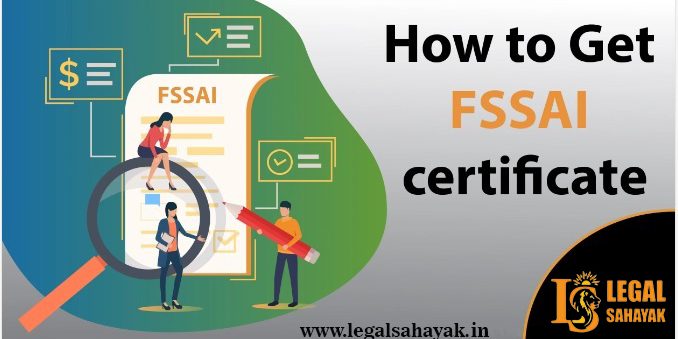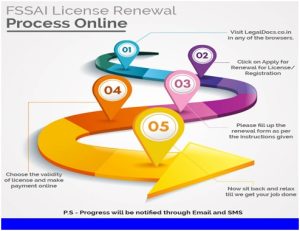How to Get FSSAI Certificate
Food business is one of the trending businesses in India, and it’s a great idea to get into it. As per the analysis, there will be above 20 crores of the food market in India. But before that, you should also be aware of the fact that before initiating and food business or business even the manufacturers you have to apply for a FSSAI License. Do you know what is FSSAI? FSSAI (Food Safety and Standard Authority in India) is an authorized and autonomous body to provide food license to the food businesses in India.
FSSAI Certificate Eligibility
FSSAI eligibility is based on the annual turnover of a Food Business Operator (FBO), such as mentioned below.
-
Basic FSSAI License
When the annual turnover of a taxpayer is below 12 lakhs rupees, the food business operator has to apply for Basic FSSAI registration.
-
State FSSAI License
When the annual turnover of the taxpayer is above 12 lakhs and above 20 crores, the food business operator has to apply for State FSSAI registration.
-
Central FSSAI License
When the annual turnover of the taxpayer is above 20 crores, the food business operator has to apply for central FSSAI registration.
- Dairy units including milk chilling units equipped to handle or process more than 50,000 liters of liquid milk per day or 2500MT of milk solid per annum.
- Vegetable oil processing units and units producing vegetable oil by the process of solvent extraction and refineries including oil expeller unit processing more than 2MT per day.
- Slaughtering units which handle more than 50 large animals or 150 small animals or more than 1000 poultry birds per day.
- Meat processing units processing more than 500kg of meat per day or 150MT per annum.
- All food processing units including repackers processing more than 2MT per day except grains, cereals and pulses milling units.
- All manufacturers of proprietary foods
- All 100% Export Oriented Units
- All importers importing food items including food ingredients and additives for commercial use
- Storage units are other than those having a controlled atmosphere and cold environment having a capacity of more than 50,000 MT.
- Cold or Registration Storage having a capacity of more than 10,000 MT.
- Controlled Atmosphere & Cold Storage having the capacity of more than 1000MT
- Wholesalers having a turnover of more than Rs.30 crores per annum.
- Retailers having a turnover of more than Rs.20 crores per annum.
- Distributors having a turnover of more than Rs.20 crores per annum.
- Suppliers having a turnover of more than Rs.20 crores per annum.
- Caterers having a turnover of more than Rs.20 crores per annum.
- Hotels-Five Star & Above.
- Restaurants having a turnover of more than Rs.20 crores per annum.
- Transporters having more than 100 vehicles or turnover of more than Rs.30 crores per annum.
- Marketers having a turnover of more than Rs.20 crores per annum.
- Marketers having a turnover of more than Rs.20 crores per annum.
- Food catering services in establishments are units under Central Government Agencies like Defence, etc.
- Storage or Wholesalers or Retailers or Distributors having premises in Central Government Agencies
What are the Documents Required for FSSAI Certificate
The documents for registration of FSSAI differs as per the types of food license taken by an FBO (Food Business Operator)
Documents for Basic FSSAI Registration
- Passport size photo of the food business operator.
- NOC by Municipality (If any)
- Individuals Identity Proof (Any One)
- Ration Card
- Voter Id Card
- PAN Card Driving License
- Passport
- Aadhar Card
How to Get FSSAI Certificate
How to Get FSSAI Certificate
 Consultation
Consultation
Get a free FSSAI Licence consultation from our experts
 Documents
Documents
Upload Documents Online, from anywhere anytime
 Approval
Approval
Easy and secure online approval
 Delivery
Delivery
Get you food license/certificate at your home
Procedure For FSSAI License Renewal
Food license renewal process is very easy, legal Sahayak has simplified the overall process. You just need to login to Legal Sahayak portal and fill up the simple application form with your user ID and password. Legal Sahayak provides free renewal consultation and with minimum documents and maximum ease your FSSAI Renewal application process is completed.
We hope that now you have enough information related to FSSAI License and a glimpse idea for FSSAI Registration. For more details to FSSAI License, you can consult with Legal Sahayak experts.
FAQs
What is FSSAI?
On August 23, 2006 all the food safety related acts came under one Food Safety and Standards Authority of India (FSSAI) which has the supreme authority related to the food like manufacturing, processing, packing, transportation and its distribution. It has become mandatory to possess a food license for everyone how are in the chain which requires the food handling at any stage. License or registration with FSSAI is necessary for everyone who is doing a food business. Whether a FBO requires a license or registration depends upon the factors like capacity of production, handling nature of food business activities and area of operation.
How much does it cost to get FSSAI license?
FSSAI license fees differ as the type of FSSAI license.
- Basic FSSAI registration – Rs. 999/-
- State FSSAI license – Rs. 15000
- Central FSSAI license – Rs. 20000/-
For Today’s Offer, please Click here
What is FoScoS FSSAI?
FSSAI launched Food Safety Compliance System (FoSCos) wef 1st June 2020 replacing existing Food Licensing and Registration System. Food License Registration certificate is required to run a food product business.
How to get FSSAI license?
Food Safety and Standard Authority of India is an authority to provide food license to food business in India. FSSAI license registration procedure is mentioned below:
- Visit LEGAL SAHAYAK website.
- Fill the draft mentioned with appropriate details.
- Submit your documents through Email.
- The documents will be verified and queries will be resolved within 2 working days.
- The applicant will get the document in 7 working days.
How long does it take to get FSSAI registration?
There are three different types of FSSAI registration, the required time for FSSAI license registration differs.
- The basic FSSAI license will be delivered in 7 working days.
- State license will be provided in 30 days.
- Central license will be provided in 30 days.
How to check FSSAI application status?
FSSAI registration is mandatory for every food business in India. You can contact our experts on 7355272224 and get to know your license related details by them.
How can I check my FSSAI license renewal status?
FSSAI license renewal can be done for 1 year or 5 years and it is mandatory for every food business in India. You can contact our experts on 7355272224 and get to know your FSSAI license renewal status by them.
Why you should get FSSAI license?
- There is a high degree of consumer confidence in safety & quality of food.
- It helps to promote innovation in foods products
- It helps in removal of multiple regulations.
- It facilitates trade without compromising consumer safety & a larger share.
What is FSSAI all about?
- Decentralization of licensing for food products.
- Simple and easy issue of license with time frame of 1 month.
- There is no license for small FBO’s only registration is mandatory.
- This act assures safety of consumer and ensures full compensation to victim in case of injury or death.
FSSAI instructions
- Food Business Operator must be registered.
-> If food Business Operator is operating in more than 1 state, one additional Central License for Head Office is necessary.
-> Importers are allowed to take one single central license at their Import Export Code address.
-> One presumption with various types of businesses is eligible for one registration only.
-> Food Business Operator must obey the rules and conditions of registration.
FSSAI registration Procedure?
- Easy Steps.
Steps 1 .
- Consultation and Documentation.
Our FSSAI expert help you with type of registration, eligibility and Documentation.
-> 1 To 2 days.
Steps 2.
- Application Filling and Approval.
You sit back Concentrate on your business. We will work diligently on your application and will be Registration ASAP.
-> 3 To 4 days.
Steps 3.
- LICENSE DELIVERY
Digital and Hard Copy of License is Delivered to your workplace .
-> 5 To 7 days.
Do I need to apply for an FSSAI license, if I am planning to sell some homemade stuff online on a very small scale?
Yes you need to have a FSSAI registration only if your business is on small scale and turnover is between 0 – 12 lakh.
I want to renew my license. How is it done?
Legal Sahayak will help you to get a new license as well as license renewal. You just need to provide your old license to us. It can be done prior to 30 days of expiring of the current license.
We have units in multiple states. Which type of license should I get?
You need to have a central Food Safety License.
What is FSSAI, 2006 & why this Act is needed?
Food Safety and Security Act of 2006 is an Act and FSSAI has been established under the that sets standards for food product based on science and regulates their production, storage, distribution,sales and imports. Its main motive was to maintain a particular standard of the food quality and to the adulteration and substandard quality of food.
Does FSSAI serve the purpose of a unified food low?
Yes, as the Act consolidates various food laws.
Who is responsible for implementation & Enforcement of FSSAI,2006? Or who is the regulatory authority under the food Act in India?
Food Safety and Standards Authority of India with the help of State Food Authorities are responsible for implementation & enforcement of FSSAI, 2006.
What are the priorities of FSSAI?
The priorities of the FSSAI is laying down science based standards for articles of food and to regulate their manufacture, storage, distribution, sales and imports, to ensure availability of safe and wholesome food for human Consumption. Its main motive was to maintain the a particular standard of the food quality and to curb the adulteration and substandard quality of food.
What does FSSAI do?
FSSAI has to do the following things:
(i) laying down science based standards for articles of food
(ii) to regulate manufacture, storage, distribution, sales and imports of food
(ii) to facilitate food safety.
Which Acts/Orders related to food is repealed in FSSAI, 2006? Or what are the major elements of the laws?
The following Acts/Orders mentioned in second schedule of the Act are going to be repealed in Food Safety and Standards Act, 2006:
- Prevention of Food Adulteration Act ,1954
- Fruit Products Order, 1955
- Meat Food Product Order, 1973
- Vegetable Oil Products (Control) Order, 1947
- Edilbe Oils Packaging (Regulation) Order, 1998 6. Solvent Extracted Oil, De oiled Meal, and Edible Flour (Control) Order,1967
- Milk and Milk Products Order, 1992
- Any other order under Essential Commodities Act, 1955 relating to food
How does this Act change the way PDA regulates the food? What are the major difference between the new Act & PFA Act?
The critical shifts from PFA to FSSAI are as under: PFA FSSAI Multiple Authorities Single Authority Adulteration Safety Inspection / Control Monitoring Surveillance Insufficient Enforcement Full time district Officer, Food Safety Personnel office under FSC
How consumers are benefited through FSSAI?
The representative of the consumer organization are members of the Food Authorities and Central Advisory Committee. So with the fear of legal action there is very less chance of food quality being poor amongst the sellers having food safety license. Thus having a Food Business registration gives you a clear advantage to increase the consumer base at a faster rate. The in case of injury of death of consumer there is a provision for compensation to the consumer.
What role Food Authority is currently playing to ensure quality and safe to the consumers?
The mandate of Food Authority is laying down science based standards for articles of food and to regulate their manufacture, storage, distribution, sales and imports, to ensure availability of safe and wholesome food for human consumption. Food Authority is in the process of formulating and finalizing the various regulation/guidelines in terms of provisions under the Act to ensure the quality and safety of food giving effect to the mandate of the Food Authority.
What is the procedure for changing standards / regulations?
(i) The new regulations / amendments will be made in the FSSAI standards / regulation from time to time and is ongoing process
(ii) The regulations / amendments will be placed before the Scientific Panels and Scientific Committee for their opinion / recommendation.
(iii) The regulation will be approval by the Food Authority and draft notified after previous approval of central Government.
(iv) The draft notification is also notified to WTO Member Countries for their comments.
(v) A time period of normally 60 days is given for information of the persons likely to be affected thereby and sending the comments to the FSSAI.
(vi) The comments received on the draft notification are examined by the FSSAI. In case of divergent comments are received on the draft standards / regulations.
(vii) The final notification published in the Gazette of India giving date of effects of its implementation and simultaneously notified to the WTO Member Countries for information & reference.
How New Act will curb increasing food adulteration?
There will be better auditing, Food Safety Management System (FSMS), traceability, recall and other systems in place which will help in curbing food adulterants.
Does FSSAI provide training to food business operators?
FSSAI create awareness about food safety with FBO and will be coordinating training with the help of accredited with agencies/ universities.
Whether Food Authority is working toward quality certification of eatables including small restaurants, street hawkers etc?
No, however the Food Safety and Standards Authority of India had supported an initiative taken by industry, States Government and other agencies to develop safety and hygiene standards for eating establishments in Delhi in preparation for the Commonwealth Games 2010.
Are there any microbiological guidelines for food in India?
There are no microbiological guidelines for food in India, however the microbiological standards exists in the FSSAI regulations for foods in India.
What are functional foods, nutraceuticals, & who is the regulation authority?
The functional food and nutraceuticals are explained in the section 22 of the FSSAI Act and will be regulated by FSSAI under section 22 of the Act which is available on FSSAI website.
Lot of Foods like Energy drinks, Nutraceuticals, Food Supplements, Functional foods etc. are coming in the market every day. Who is the regulatory authority for these products and what is being done to ensure the quality and safety standards of these products?
The FSSAI is in the process of developing the regulation for Novel Foods functional foods, food supplements etc. which is under consideration of the Scientific Panel on Functional Foods, Nutraceuticals Dietetic Products and Other Similar Products of the Food Authority and will further ne considered by the Scientific Committee, Food Authority and notified in the Official Gazette after previous approval of the Central Government.
What are GM foods & organic foods & does FSSAI provides regulations for such type of foods?
GM foods means food and food ingredients composed of or containing genetically modified or engineered organisms obtained through modern biotechnology, or food and food ingredients produced from but not containing genetically modified. The GM foods does not come under the purview of FSSAI. “Organic food” means food products that have been produced in accordance with specified organic production standards.
How can I know whether a particular food additive can be used in a food product in India?
The limit for use of particular food additives can be seen in the FSSAI regulation 2010 for food additives which are available on FSSAI website.
What is a food recall & what is its purpose?
“Recall” means action taken to remove a marketed food from distribution sale and consumption which is unsafe and violate the provisions of the Act and the rules & regulations made there under. The purpose is to prevent, reduce or eliminate a risk arising from food to the consumer.
Where can consumers find information on recalls of food products?
The information on recall of food products may be provided on Food Authority website.
What should consumers do if they have a product that has been recalled?
The consumer should not consume the product and return it to the shopkeeper from where they have purchase the product or return it to the company representative.
How do I complain about food bought from a shop or restaurant?
The consumer should complain to the Food Safety Officer / Designated Officer / DC of the area or Food Safety Commissioner of the State.
Where can one obtain information of food safety?
The information can be obtained from website of the FSSAI
What is the maximum penalty for breach of regulations related to the labeling of food items?
It is upto 10 lakhs
What is the role of Food Authority vis-à-vis ban on import of milk products from China and what is the current status in the matter? What steps have been taken by the Government to stop melamine contamination?
FSSAI has issued Advisory to the concerned Ministries / Departments for imposing immediate restriction on import of dairy products from China. The DGFT has imposed ban on import of milk and milk products from China upto December, 2011 and until further orders.
What are the online available payment options?
It is through draft, credit card, online banking.
What information do I deed to make payment online?
You have to fill up the online from and attach documents.
If I apply online, will I get my license faster than if I apply by mail or in person?
Procedure will remain the same.
Whether there will be a single or different license for the same premises if they are multiple licenses for different product by same FBO?
There will be different license issued under FSSAI as requirement of each product is different. So in the same premises if license is being taken for processing of meat, milk & fruits & vegetables, there will be a separate license as these will be done in separate portions & businesses are not connected. However, in case there is fruit & vegetable processing & godown / store along with it, since these are connected activities, one license is applicable. FAQ on Food Safety Management Systems (FSMS)
What is meant by Food Safety Management Systems (FSMS)?
A Food Safety Management System (FSMS) is a network of interrelated elements that combine to ensure that food does not cause adverse human health effects.
What are the Key Elements of FSMS?
The five basic key elements are: Good Practices / PRPs Hazard Analysis Management Element / System Statutory and regulatory requirements Communication
Which Section of FSS Act, 2006 describes FSMS?
Section 16(2)(c) provides for the Mechanism for accreditation of certification bodies for Food Safety Management Systems and Section 44 of FSS Act provides for Recognition of organization or agency for food safety audit and checking compliance with Food Safety Management System required under the Act or the rules and regulation made there under.
What is the Purpose of FSMS?
To ensure the manufacture, storage, distribution and sale of safe Food.
Give the name of agencies which have been empanelled by FSSAI for inspection/ auditing of FBOs?
The list of shortlisted agencies for Inspection / Auditing of FBOs are as under: 1. M/s. Export Inspection Council of India, Delhi 2. M/s. Indian Register Quality Systems, Mumbai 3. M/s. INDOCERT, Kerala 4. M/s. TUV SUD South Asia, Mumbai 5. M/s. Det Norske Veritas, AS, Mumbai 6. M/s One Cert Asia Agri Certification Pvt. Ltd., Jaipur 7. M/s. National Productivity Council, Delhi
Who will assign the job to agency. Do agencies have to contact FBO directly?
There are various job as per scope of work. Inspections will be ordered by State/Central Licensing Authority/ DO. Auditing can also be ordered by respective Dos.
However for annual audit/ consultancy, training, FSMS plan etc. have to be handled by agency on the requirement of FBO.
Whether the Food Business Operators are assigned by FSSAI in the place where the Inspection / Certification Body is located or anywhere in India?
Food Safety Commissioner can decide about agencies for their States/areas. FBOs are free to choose as per their requirement.
If more than 1 agency is located at the same place then who will decide which agency will go for the FBO Inspection?
The power lies with the Designated Officer. DO has to decide if he is authorising agency or his FSOs for such inspection.
How many times inspection has to be conducted in a year?
Depends on Improvement / compliance Submitted by Agency, DO will decide accordingly. Inspections are to be ordered by DO.
What is FSSAI License?
Food safety registration with FSSAI is necessary for everyone who is doing a good business. Whether a FBO requires a FSSAI License or registration depends upon the factors like capacity of production, handling nature of food business activities and area of operation.
Do I need to apply for a FSSAI Food license, if I am planning to sell some homemade stuff online on a very small scale?
Yes you need to have a FSSAI registration only if your business is on small scale and turnover is between 0-12 lakh.
We have units in multiple states. Which type of FSSAI License should I get?
You need to have a central FSSAI License.
Does FSSA serve the purpose of a unified food law?
Yes, as the Act consolidates various food laws.
What is FSSAI Registration fee?
LEGAL SAHAYAK provides the best service at affordable prices. Basic registration starts from Rs 3500/-, State License Starts From Rs. 10000/- and central license starts from Rs. 17000/-.
How to check FSSAI License Number online?
You can check FSSAI License Number online on FSSAI website.
Who is the regulatory authority under the Food Act in India?
Food Safety and Standards Authority of India (FSSAI) with the help of State Food Authorities are responsible for implementation & enforcement of FSSA, 2006.
What does FSSAI do?
FSSAI has to do the following things:
(i) Laying down science based standards for articles of food
(ii) To regulate manufacture.








